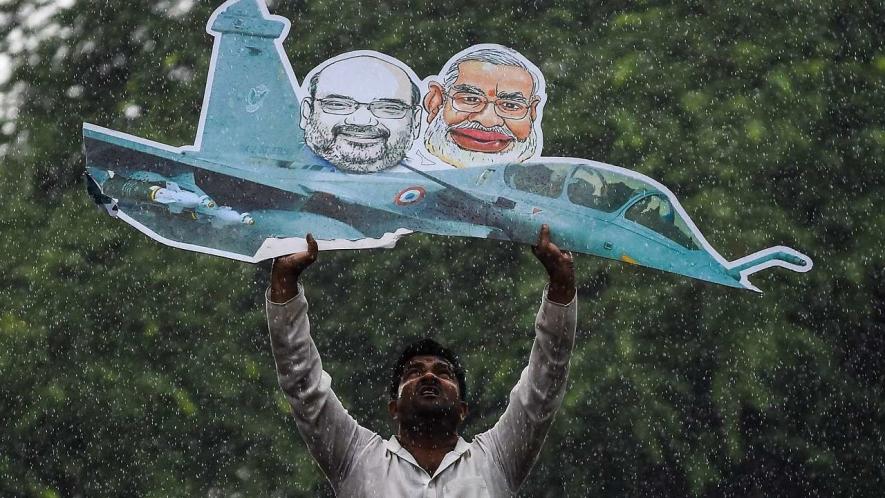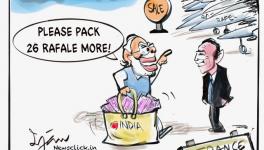Govt. Waived Anti-corruption Clauses in Rafale Deal, Says Report

As per a report by N Ram in The Hindu, it has been learnt that the controversial Rafale deal between India and France involved major and unprecedented concessions from the Indian government regarding critical provisions for anti-corruption penalties. The report also says that the provision to make payments through an escrow account was dropped. This was done days before the signing of the inter-governmental agreement (IGA).
Official documents in possession of The Hindu reveal that the Defence Acquisition Council (DAC) chaired by the then Defence Minister Manohar Parrikar met in September 2016, and “ratified and approved” eight changes in the IGA, supply protocols, offset contracts and offset schedules. This was done after the IGA and associated documents had been approved by the Cabinet Committee on Security (CCS), chaired by Prime Minister Narendra Modi on August 24, 2016.
The high-level political intervention meant that standard Defence Procurement Procedure (DPP) clauses on “Penalty for use of Undue Influence, Agents/Agency Commission, and Access to Company accounts” of Dassault Aviation and MBDA France were dropped by the Indian government in the supply protocols.
The most significant among these eight changes, recorded in a note signed by Vice Admiral Ajit Kumar, DCIDS (PP&FD), who was the member-secretary of the DAC, states: “Non-inclusion of the Standard DPP Clauses related to ‘Penalty for Undue Influence,’ ‘Agents/Agency Commission’ and ‘Access to Company Accounts’ in the Supply Protocols.”
While the IGA was the overarching agreement between the governments of India and France, the supply protocols were to be executed by Dassault and MBDA, the two private companies. Therefore, the fact that these clauses were dropped by the Indian government from the supply protocols is of major significance.
According to the report in The Hindu, this direct dealing with the commercial suppliers, under cover of an IGA, was highlighted in a detailed note of dissent signed by three members of the Indian Negotiating Team — M.P. Singh, Adviser (Cost), A.R. Sule, Financial Manager (Air), and Rajeev Verma, Joint Secretary and Acquisitions Manager (Air). The document, which is available with the The Hindu, reveals that these three members took a strong stand against what was being rammed through.
On the direct dealing with the two companies, they noted: “Notwithstanding the fact that the procurement is on Government-to-Government basis, the IGA involves ‘Transfer of Rights and Obligations’ relating to supplies of equipment and related industrial services by French Government to the French Industrial Suppliers, and the payment is also being made to the French Industrial Suppliers and not to the French Government; therefore, it is not advisable to sacrifice the basic requirement of financial prudence.”
The Rafale deal was signed between India and France under the terms of DPP-2013 and the Standard Clauses in Contract are mentioned in Enclosure 8 of DPP-2013. This has sections on penalties for the use of undue influence, an integrity pact, agents/agency commission and access to book of accounts. Paragraph 37 of Request for Proposal (RFP) in DPP-2013 states that “the Standard Contract Document at Chapter V of DPP2013 [bit.ly/DPP-2013] indicates the general conditions of contract that would be the guideline for all acquisitions”.
Despite the DPP stating explicitly that the Standard Contract Document “would be the guideline for all acquisitions”, the Indian government chose to remove these clauses from the supply protocols with the two private defence suppliers. According to the report in The Hindu, “This assumes particular importance as the government also chose to do away with a sovereign or bank guarantee from France and settled for a letter of comfort, which is not legally binding, from the French Prime Minister.”
This letter of comfort came after another last-minute intervention by the Indian government in September, when the Cabinet Committee on Security chaired by the prime minister issued a corrigendum to the note forwarded by the Defence Ministry for the CCS, doing away with the requirement for an escrow account operated by the French government to make payments to the two companies. This proposal to amend the IGA, which had been approved by the CCS on August 24, 2016, was moved by Smita Nagaraj, director, General Acquisition, in the Defence Ministry.
The note stated, “Raksha Mantri has directed that attention of Secretariat is drawn to the fact that in the context of the proposal contained in Para 50(b) of the CCS Note, stated that in the event of payment into escrow account is not found feasible, MOD shall work out alternative safeguards in consultation with the French Government, in which an assurance will be obtained from the French Government to provide effective oversight of utilization of payments released to the French industrial suppliers.”
The amended Para 50(b) of the CCS Note approving the IGA did away with the need for ensuring that the payments made by the Indian government were done through an escrow account operated by the French government. The escrow account was a measure of financial prudence: the payments would be released by the French government to Dassault and MBDA with the concurrence of the Indian government.
The proposal to have an escrow account operated by the French Government was recommended by Sudhansu Mohanty, Financial Adviser (DS) on January 14, 2016. It was in Note-263, which begins with this qualification, “I wish I had sufficient time to go through the entire file, and mull over the various issues raised. However, in view of the fact that the file has to be submitted to RM immediately, I would like to make the following quick observations from the Finance point of view.”
One of Mohanty’s important observations was: “In the absence of a sovereign/bank guarantee, in a case like this where an IGA is to be signed, it would be prudent to involve the French Govt. as far as releases are concerned. This possibly could be done through an Escrow account or a variant of the same where the money released by the buyer (Govt. of India) is paid to the Escrow account held under the charge of French Govt. to make further payments to the firm as per terms & conditions agreed to by the Indian and French Govt. through IGA. This would make French Govt. morally and materially responsible for the procurement so proposed. Since they are one of the parties to the IGA and also jointly and severally responsible for the execution of the supply protocol, they should not be having any reservation about it.” Evidently, the French government did.
What is now known is that Mr. Mohanty’s note came after the Prime Minister’s Office (PMO) and National Security Adviser Ajit Doval chose to waive the sovereign or bank guarantee from France.
According to the documents available with The Hindu, the need for a sovereign or a bank guarantee was also highlighted by the Ministry of Law and Justice in its communications to the Defence Ministry.
As per the report, the part played by Mr. Parrikar in the Rafale deal was established as, “a stance of being non-committal, as evidenced by his hand-written notation of January 11, 2016, he shifted later that year to actively pushing for the changes, giving the financial experts little time to study the proposals”.
He chaired the September 2016 meeting of the Defence Acquisition Council that “ratified and approved” the eight changes, including the decision to drop the provision of penalties for corruption in the supply protocols with the private companies.
In his official capacity, he also directed the issue of a proposal that led to doing away with the provision for an escrow account as a financial safeguard.
This has significant political implications for the Narendra Modi government which has claimed that eliminating corruption is a major plank of its agenda for governance, and promised action against alleged corruption in defence deals struck during the United Progressive Alliance Government.
What is also worth noting is that neither this, nor the other important information published by The Hindu on the “parallel negotiations” conducted by the Prime Minister’s Office and the National Security Adviser seems to have found a place in the material submitted by the government to the Supreme Court of India.
Read more: MoD Had Protested Against PMO Undermining Rafale Negotiations, Says Report
Get the latest reports & analysis with people's perspective on Protests, movements & deep analytical videos, discussions of the current affairs in your Telegram app. Subscribe to NewsClick's Telegram channel & get Real-Time updates on stories, as they get published on our website.
























